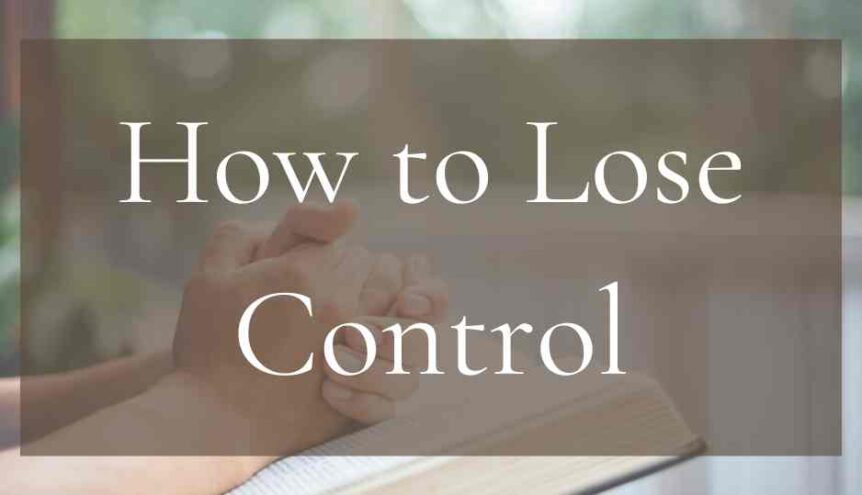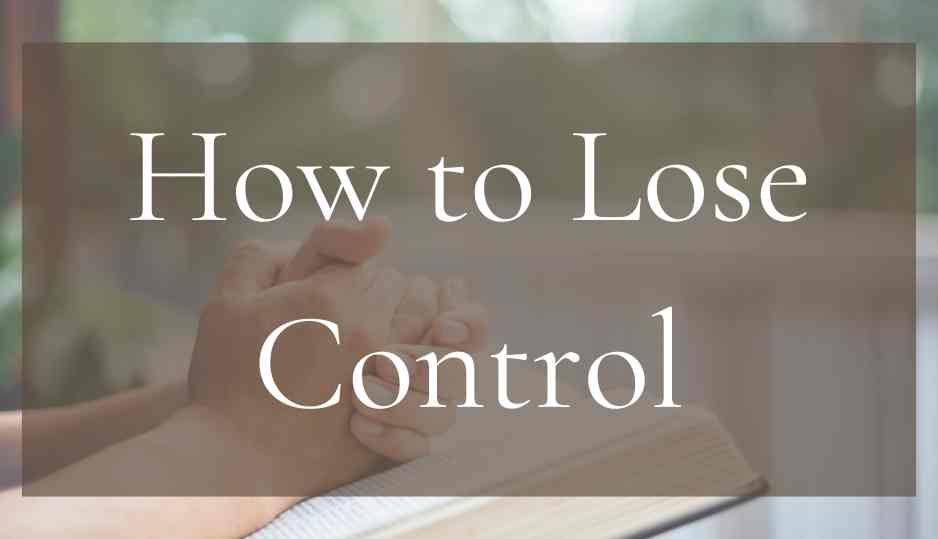When was the last time you felt a need to control a situation? I stumble across this challenge daily (dare I say several times a day?) It’s one of those personality traits the Lord and I have been working out over the last several years.
If you have the same problem, you can blame it on Eve. Of course, if she hadn’t blown it by taking the serpent’s bait, her daughter, granddaughter, or some other woman down the genetic line would’ve.
And let’s consider Adam. What did he do when Eve chose to eat the forbidden fruit? Well, he didn’t exercise his God-given authority over her and tell her it was Forbidden, therefore not a good idea. Nope, instead, he took it from her and ate it, too.
Thirteen chapters later, we see the same problem arise between Abraham and Sarah. It doesn’t matter how many times I read through the Bible, I always get irked with Sarah in Genesis 16. She decides God’s promise for a baby isn’t coming fast enough and intercedes. First off, the promise was for Abraham and Sarah—not Abraham and Sarah’s servant, Hagar.
It’s not bad enough she takes control of the whole baby-making project by pushing Hagar onto Abraham to conceive the promised child. But when her pride gets pricked by Hagar’s attitude, she turns on Abraham and blames him for the fiasco.
Honestly, I think my frustration comes from recognizing a little bit of myself in Sarah’s attitude. Can you relate?
Just like Adam before him, Abraham becomes a passive co-conspirator. We shouldn’t be surprised, though, since he’d twice had Sarah lie about being his wife to protect himself—even though it put her at risk.
We don’t get through Genesis without seeing this control versus passivity played out over and over again. Rachel manipulates things for Esau and Jacob is clueless. Potiphar’s wife attempts to manipulate Joseph. Thankfully, Joseph wasn’t passive. Then again, he wasn’t married to her. She certainly had no problem convincing Potiphar of her lies—which landed poor Joseph in prison.
There is example after example of this dichotomy within the pages of the Bible. Is it any wonder we still struggle with this issue today? For women, the need to control is in our genetic makeup. The default for men is passivity.
I believe our need for control is at best a lack of faith and at worst, a sin. Think about it. If we truly had faith in God, wouldn’t we be able to surrender everything to Jesus without doubt or worry? Often, that control takes on the form of manipulation, which is a quick path down a dark road.
We become like the serpent in the garden.
We seriously need to learn how to lose control—in a good way.
Most women can easily identify with Martha in Luke 10: 38-42 as she fusses around her home to prepare a meal for Jesus. How many of us have done the same thing? We are so focused on making everything “perfect” and keeping control that we miss out on the blessings available in the moment. And there’s Mary, sitting at the feet of Jesus, vexing Martha all the more.
But what if we followed Mary’s example rather than Martha’s? We can choose to let go of our agenda and leave it at the feet of Jesus. He has a much broader, deeper view of our situation. He knows not only the past and present but the future as well.
Ephesians 5:22 says, “Wives, submit yourselves to your own husbands as you do to the Lord. For the husband is head of the wife as Christ is the head of the church…”
I’ve had many Christian wives say they can’t submit to their husbands because they’re too passive and don’t make decisions quickly enough to suit them. I get that. I tend to process things more quickly than Chris. But, disregarding his leadership in the marriage and taking control is not the answer.
The first time I prayerfully submitted to Chris was early in our marriage. We were attending a church I didn’t like. It was set up like a classroom with services four nights a week. The pastor lectured, and we took copious notes. I won’t get into the nitty-gritty of why I felt this wasn’t the right biblical teacher for me, because that doesn’t matter.
Rather than push my will onto Chris, I decided to trust in my newfound faith. I had already failed in one marriage, and I didn’t want to make the same mistakes again. So, I prayed, Father, You know how I feel about this church. Please either change my heart or change Chris’s mind. Then came the hard part—I kept my mouth shut. Whenever I felt the need to nag, I prayed instead.
Two weeks after I started praying, Chris suggested we try a different church. This response to my prayers encouraged me, and little by little, I have gotten better at letting go and letting God. Does that mean I no longer struggle at times? No, but it is much less often.
For those of you who have passive husbands, let me encourage you. The more you pray for him and be an encourager rather than nag at him, the more likely he will want to hear what you have to say in any given situation. Because, as Proverbs 21:9 says, “It is better to live on a corner of a roof than to share a house with a quarrelsome wife.”
Let me leave you with this suggestion: If you’ve never read Gary Thomas’s book Sacred Marriage, I highly recommend it to you and your spouse. The subtitle is What if God Designed Marriage to Make Us Holy More Than to Make Us Happy?
Just a little food for thought.








Comments 1
I so identify!!!!